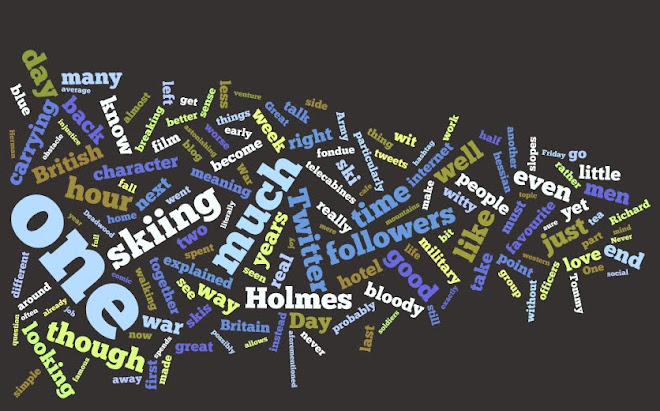Holmes is a hugely respected military historian and many of you will have perhaps seen his programmes on TV (if not look at UKTV History, one of them's bound to be on) and will be aware of his astonishing factual knowledge, but as well as this there's a humility to his tales. He does not feel compelled to rely on the cheap shocks and gory theatrics that many modern historians pepper their programmes with. One of his most enduring series 'War Walks' is available here on Youtube and as one might imagine features a lot of walking, but even then it's simple walking towards the camera (with the cameraman backpeddling furiously) there's very little incessant hand waving, like your Schamas and your Starkeys, instead he offers a few pointed directions, stopping only to converse in French with a munitions expert and then casually carry on the narrative.
Holmes as a speaker is very much the same as Holmes the author- scholarly, equal parts lugubrious and droll, but most of all passionate about history. He spends much of each year in Flanders fields, examing the pockmarked remnants of the Western front and has an extensive, perhaps intimate, knowledge of what I would venture to be his favourite topic, the Great War and it was the objective of his talk (as it was his book) to challenge the popular conceptions about this oft-considered dark chapter in British military history.
He begins with a criticism of most Brits approach to the Great War- poetry. I should make clear that he has nothing but the utmost respect and admiration of these great poets- Owen, Sasoon, Gurney- but he simply feels that impression that one gleans from their work is not an accurate portrayal of the average British Tommy. Over the course of an hour he explains the changing face of the procedure of everyday life over those 4 years of war with a good deal of charm- from the stand-to before first light, to sneaking some food and a 1/16th of a pint of rum at night. 'Breakfast' he explained 'consisted of military order biscuit, bacon and a few drops of tea. The food was carried in hessian sacks, now, hessian has a sort of creosote-y flavour, a little unfortunate. The tea will taste a little of petrol as the petrol cans doubled as water containers. So your tea was a bit petrol-y and your bacon tasted of hessian, but you were generally in good spirits.' He explained that when the men were in reserve the padres would organise a film for them to watch though 'generally a Tommy was more interested in alcohol and women. The padres helped with the former and some of them- God bless them- with the latter.' As one can see, Holmes has a good deal of dry wit in his delivery but in lecturer mode it is appropriately always tempered with a sense of sobriety, seriousness, menace perhaps.
Though his talk is amusing, the underlying sense of melancholy is just as strong, particularly when he is discussing the first-hand accounts and the men joining
He explained how the revisionist 'lions led by donkeys' opinion of the 60s did a great injustice to the British officers, more of whom gave their lives in this war than any other. Almost half of the officers by 1918 were raised from the ranks, breaking down the class barriers, however when it came to the end of the war they were left jobless and the social upheaval that they had spurred on in those 4 years had fizzled out. During the Q&A session, Holmes fielded a question on the subject of Haig being the 'Butcher of the
Naturally it's impossible to anatomise the experiences over 4 years of the average British soldier in an hour long lecture, but Holmes gives it a bloody good go and one can't help but be sucked in by his charisma as a speaker. He's intensely knowledgable, witty and, in conversation, a very warm character with a true love of his subject. He spoke for an hour in great detail without so much as one piece of notepaper to aid him and fielded a number of insightful questions with remarkable ease. His final statement was a resounding one and I wholeheartedly agree. While there were terrible losses, we should take great pride in what our brave Tommies, their commanding officers and the soldiers of the Commonwealth achieved against the formidable German army in those 4 long years and though our last remnants of the war passed away with Harry Patch last year, we should never do them the injustice of looking upon it as the darkest hour of 20th century Britain, instead we should venerate those young men with us no more and remember it as the hour in which Britain won a remarkable, hard-fought victory.




